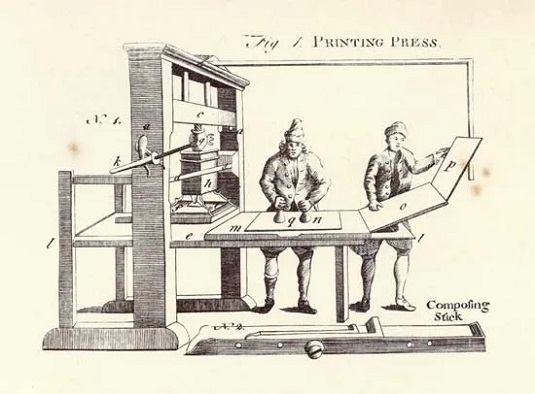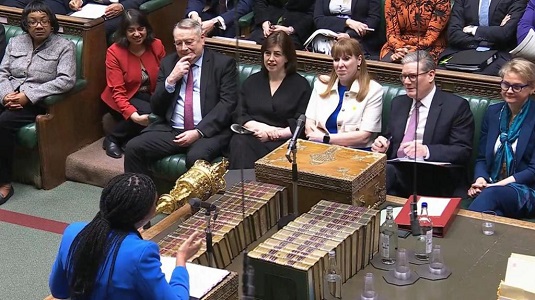
Undoubtedly, Reform will do very well on Thursday. Not least thanks to the heaps of media coverage they receive. But it's worth remembering that the last time this clutch of seats were up, it was at the height of Boris Johnson's powers. And by coincidence, a Labour-held parliamentary seat is also in the mix. It's not terribly likely that they will hold on to Runcorn, though the result will probably hinge more on Labour's support having places to go and staying at home rather than turning en masse to Reform. If Farage adds another MP to the parliamentary roster, how his campaign has dug into the Tories and united the right wing anti-Labour vote behind them will have done much of the heavy lifting. If that happens, Tory/Reform talk will graduate from whispers to audible grumbles.
Ah yes, the Tories. Let's talk about them. The 2021 locals marked the Tories at their greatest extent. After pausing council elections the year previously thanks to Covid, the bloody baptism of Keir Starmer's first election test reflected more the public opinion adjustment following the 2019 election and the consolidation of goodwill the Tories (undeservedly) reaped for handling the pandemic than popular perceptions of/discontent with Labour's leader. But because Starmer's sunk new wells of antipathy and the character of the switchers from Labour to the Tories, Kemi Badenoch's crew are disproportionately exposed to Reform. Despite what Number 10 and the media would have us believe, it is the Conservatives who stand to have their local government base eviscerated. But one shouldn't just look to the right. The Liberal Democrats are well poised to gouge pounds of flesh out of the Tory rump, seeing as Badenoch and pretty much all the party have decided centre-leaning soft conservatives aren't worth bothering with.
Will this be the story come Friday morning? The Tories will do worse than Labour, but Badenoch and her putative successor will take Reform victories as a message that they need to get even more right wing. Despite what will be big losses to the Lib Dems in former heartland seats. And for Labour, if Runcorn goes and a smattering of council seats elsewhere, identical conclusions will be drawn. In other words, for both of the declining main parties, the evidence of the polls are not an occasion for thinking, reflecting, and reconsidering their political strategies. No, the preconceived narratives have already been written and the numbers will be made to fit them.
Image Credit
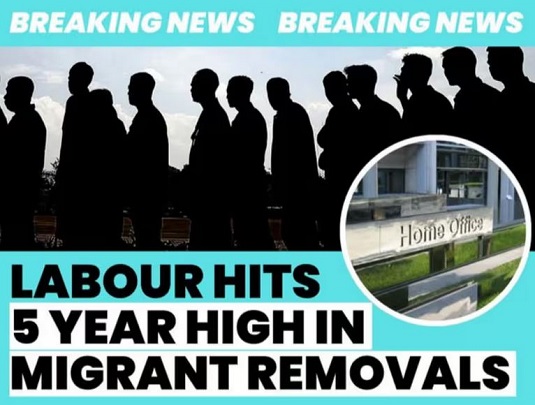
For example, 11% of Labour's 2024 coalition fall into the 'Reform curious' category. And if all of them switched their allegiance at the next election, all other things being equal the party would shed 123 seats. Blimey, that sounds serious. In other parts of the country the problems are worse. In seats where Reform came second, 13% of Labour voters are open to swapping Keir Starmer for Nigel Farage. In Scotland, potential defectors are pegged at around 18% of the vote. A case of keep calm, carry on scapegoating the immigrants, and everything will be alright. Right? No. The polling finds 29% of the 2024 Labour coalition are 'Green curious', and 41% are prepared to support the Liberal Democrats under the right circumstances. And those said circumstances cover substantive lurches to the right.
The Reform-curious tend to share similar demographic characteristics with Reform voters at large (white, older, disproportionately male), are more socially conservative than the rest of the Labour base, and for 66% of whom immigration is the key political issue. But these positions are "worn lightly". For example, p.34 shows the long distance between the Reform curious and actual Reform supporters, even though they're on the right of Labour's coalition. For the latter, anti-immigration, anti-Green measures, and their antipathy to "woke" is baked into their world views. For the Reform curious Labour voters, it's more of an inclination.
This is important, because it suggests rightist tendencies within Labour's coalition could be overcome without too much bother. However, capitulating to them would be devastating. The centrepiece of Akehurst's research is an experiment which measured the weighted sample's responses to Labour adopting certain policies (p.67). It finds that leaning right on immigration keeps a few percentage points of the Reform curious on board, whereas the most extreme position - banning all immigration - could reach into the Reform vote itself. But the price paid would be the mass abandonment of the party by left wing voters. And this is after many liberal and left wing voters had already gone elsewhere in 2024. Going right secures negligible benefits at significant cost.
How might Labour avoid this fate? By not shifting right. Akehurst establishes that many of the Reform curious are "economically populist", or in straight forward terms, left wing on materialist issues. Workers rights, tackling inequality, rebuilding public services, and wealth taxes are much more popular with this group than Reform voters at large. And, electorally speaking, it's the sweet spot. Avoiding the ground favoured by the right and pushing populist economic messages against entrenched interests loses no votes to the left, and crucially none to the right either. The study does not look at voters who went elsewhere last year, but as there is a growing progressive majority in this country, such positioning could recapture votes lost and go a long way to secure the party its second term.
Picture the scene when these findings lit up the Downing Street radar on Monday morning. Will Labour alter its policy direction in light of this evidence? Will it change their strategy where the ignominious collapse of the Democrats and its centre left brethren on the continent have so far failed to convince? I'm sorry to say Morgan McSweeney is likely to file this report in the trash folder. This isn't because he genuinely thinks the path to re-election lies through racist posturing, but that his project - and that of Starmer's more generally - is about managing the politics in capital's interest. This means patrolling the political terrain so things like hope and raised aspirations are shot down if they so much as peer out of their foxholes. This government has constructed a fiscal fiction designed purposely to dampen expectations, and is refusing to countenance taxes on capital and wealth because, well, the more class conscious sections of our rulers fear where that might lead. The data is inconvenient, because it's at cross purposes to the government's project. And so into the bin this useful and interesting piece of work will go, while the "Morganiser" carries on laying the foundation for a catastrophic rout four years hence.
Image Credit

But for those who work with data broadly - not just the digitised kind - it is embedded in the job description. Data is a system of concretised ethics enforced by the employment relation, in the first instance, and horizons of credibility, of social conventions based on the the affirmation and demonstration of evidence. As I am an academic, the concern for data determines the character of the presentation of research, the marketing and student experience efforts that cover my programmes, and must be invoked to justify changes to course content and assessment, the launch of new degrees, and the business case for taking on new staff. This is the lot of other education workers, particularly teachers with the vast trail of paperwork cataloguing their practice as educators, and also civil servants, mid-level managers across the public and private sectors, buyers in retail - every job that requires making decisions about the delivery of a service or the provision of a product.
And it directly governs. Since the emergence of modern wage labour in the English countryside, targets have been one tool among many used by employers to individuate and atomise workforces to enable their management. Today, when immaterial labour predominates and is simultaneously being attacked and deskilled, targets as a method have proliferated into a matrix of performance indicators for managing post-industrial labour. The worker, from the lowest paid to the relatively affluent are subjected (and subjectivated) by streams of algorithms and targets that measure aptitudes, define productivity, and determine the character of one's tasks. They shove (rather than nudge) labour along prescriptive circuits. The data points workers are judged by are often conjoined with those outside of their control - such as market conditions - and they are held to account against them.
Data as employed in capitalist societies is not just a practice/technology for managing workers, it has the characteristics of a moral code. Of, more precisely, a bourgeois morality. Like religion, the moralities of law and order, and the explicit statements of bootstraps neoliberalism, their subjects are the objects of exploitation. Bourgeois morality marks the bourgeoisie's innumerable, multitudinous others, and works to govern them. They themselves are, by and large, left unmarked. The neutral term. The starting point. That natural way of the world. Therefore, moralities spiritual and secular do not apply to them. The same is true of data.
How many CEOs "abbreviate" the evidence-based decision-making they enforce on their employees? How many politicians are impervious to the data-heavy briefings handed them by civil servants when they push particular policies? The further up the hierarchy one travels, the employment of data becomes more episodic, and its status as a tool of governance becomes all the clearer. These exalted levels operate with different sets of priorities: not what data tells them about what decisions would bring the greatest benefit to the greatest number, nor even in the narrower terms of using data to prioritise economic growth. No, data plays second fiddle to the politics of class maintenance. The successful exercise and preservation of class privilege and class power requires flexibility and opportunist nous. The realpolitik of our rulers depends on instinct and the feels in the first place, and the enforcement of decisions that reiterate their power-over. In these mundane circumstances of capitalism's everyday, data that shows they're wrong is simply noise.
Image Credit
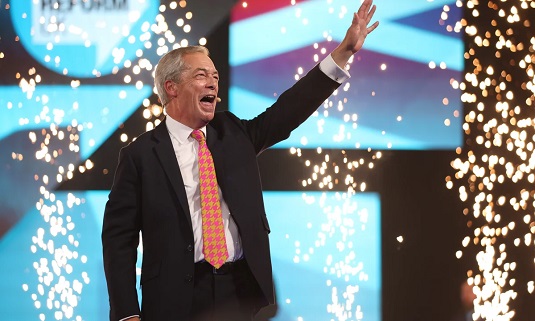
Party
|
Number of Candidates
|
Total Vote
|
%
|
+/- Mar
|
+/- Apr 24
|
Avge/
Contest
|
+/-
Seats
|
Conservative
|
13
| 2,589 |
13.1%
| -7.1 |
-17.8
|
199
|
-1
|
Labour
|
12
| 3,891 |
19.6%
| -1.5 |
-2.8
| 324
|
-4
|
Lib Dem
|
11
| 4,143
|
20.9%
| +6.3 |
+1.7
|
377
|
+2
|
Reform*
|
11
| 3,901
|
19.7%
| +3.6 |
+19.1
|
355
|
+3
|
Green
|
9
| 2,644
|
13.3%
| +4.1
|
+8.0
|
294
|
+1
|
SNP**
|
1
| 1,439 |
7.3%
| -1.6 |
-0.6
| 1,439
|
0
|
PC***
|
2
| 629 |
3.2%
| +2.1 |
+3.2
| 315
|
0
|
Ind****
|
5
| 501 |
2.5%
|
-4.5 |
-11.8
|
100
|
-1
|
Other*****
|
4
|
91 |
0.5%
| -1.4 |
-4.8
|
23
|
0
|
* Reform's comparison results are based on recomputing their tallies from last year's Others
** There was one by-election on Scotland
*** There were two by-elections in Wales
**** There were no Independent clashes this month
***** Others in April consisted of Christian People's Alliance (24), Communist League (8), TUSC (25, 34)
Two firsts this month! For the first time ever in a normal set of by-elections, the top two positions popular vote-wise did not feature either Labour or the Tories. The Liberal Democrats came first, and Reform pipped Labour to the post by just 10 votes. And the other? The Greens managed to outpoll the Tories. They haven't even done that to the Lib Dems yet. So credible results for everyone who are not the big two and wooden spoons for them. Particularly Kemi Badenoch's crew who registered their lowest level of support ever, sinking deeper than the 17% they scored in March 2024.
What does it mean? It suggests that a Tory recovery is just not happening, portending a real bloodbath next Thursday. Labour, who did dismally here by dropping four seats, are not in as bad a way as their official opposition, but there's room for them to drop further as stupid and counter=productive policies keep getting rolled out. In all, what might the shape of next month's results look like? A lot like this, I'd wager.
3 April
Lincoln, Park, LDem gain from Lab
Neath Port Talbot, Cwmllynfell & Ystalyfera, LDem gain from Lab
St Helens, Sutton South East, Ref gain from LDem
10 April
Gwynedd, Teigl, PC hold
Haringey, St Ann's, Grn gain from Lab
Sutton, Sutton Central, LDem hold
Tameside, Longdendale, Ref gain from Lab
17 April
Horsham, Colgate & Rusper, LDem gain from Con
Torridge, Appledore, LDem gain from Ind
24 April
Arun, Marine, Ref gain from Ind
Fife, Glenrothes Central & Thornton, SNP hold
Suffolk, St John's, Lab hold
West Berkshire, Thatcham North East, LDem hold
Image Credit
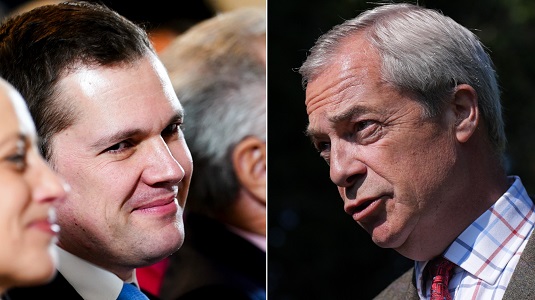
A read of Jenrick's comments reveals that he was proposing a united coalition of the right in a general sense rather than an alliance with Reform. He confirms what has often been highlighted by this corner of the internet, that his (as well as the project of the Tory right) is a doomed effort at "rebuilding the coalition of voters we had in 2019 and can have again." That said, Jenrick is a slippery politician without an ounce of character, so if there is a Conservative front bencher tipped as leader material and capable of forming a Faustian association with Nigel Farage, it's him.
We've also talked many times about how and why and Tory/Reform alliance is a non-starter for both parties. The Tories simultaneously need to consolidate their base, which has been annexed in large part by Reform. But heading to the right is not going to win many of those disgruntled former supporters back, because Boris Johnson, Brexit betrayals, etc. etc. But as the Tories bear right to prove their politics, which in a certain light makes a bit of sense, they're abandoning the traditional Tory heartlands to the Liberal Democrats. Where Reform are concerned, an alliance with the Tories is unlikely to go down well with their Mr Angry brigades. And recent polling backs this assertion.
Ways around this? An arrangement in 2029 where both parties encourage a low key tactical voting campaign from the right is a possibility. An alliance can't be ruled out in the event of the combined Tory/Reform seat share being enough for a majority, and if that happens all thought about what the base thinks goes out of the window. We saw the Lib Dems torch themselves in 2010 for the chance of ministerial jobs, and one can't suppose Farage would be held back by what the good people of Clacton thinks if similar opportunities open for him. He hasn't demonstrated their limiting influence vis his support for Donald Trump and Russia so far. Similarly, Labour are also machine-gunning their feet, so Reform would be joining what is now an established tradition common to all electorally successful parties - if they do form a government with the Tories.
This is all crystal ball stuff, but does say something about how politics on the right are going to play out over the next four years. Badenoch and her successor, should she suffer the ignominy of the Iain Duncan Smith treatment, are menaced by Reform and cannot conceive of any strategy beyond absorbing them by, effectively, becoming Reform. Life for Farage is much easier. He can rely on the media to continue framing politics around his programme, causing the Tories and Labour to jig along to his racist dirge. The Tories are only a bother when they get too close and too chummy to his party this side of the next election. However this all plays out, the psychodrama on the right, the Conservative inability to cope with a serious rival for the right wing vote is ensuring more bitterness, more poison, and more toxicity will spread from there to the rest of mainstream politics.
Image Credit

The politics are, on the surface, pretty straightforward. Because in Starmerland the working class are coded as Reform-supporting racists, pandering to scapegoats will turn the heads of this largely imaginary constituency. You can picture it on the nation's mobile phones. The BBC News alert pops up with Cooper's initiative, and the couple of million looking to vote for Nigel Farage at the upcoming council elections will look at it, curse the Tories' softness, and head to the polls with Labour voting intentions in their hearts. But, of course, this is not going to happen. Reform, you might recall, is a difficulty for Labour but an existential dread for the Tories, making this in strategic terms a fool's errand. Why chase after voters breaking to the right of the Tories on cultural issues instead of shoring up one's own fraying base, or making an offer that might appeal to the apparently "economically progressive" side of the artefactual Labour-Reform switcher?
There is no political mileage for Labour in pandering to the racist mischief thr right stirs up about foreign criminals. So what's the attraction? There is a joy a certain kind of middle class politician has in bureaucratically squishing little people, and especially so if one expects plaudits. Who cares about foreign criminals? They are the perfect out group, a scapegoat tailor made for scapegoating. And Labour needs its scapegoats. But there's more! Anything that is adjacent to cracking down on immigration and immigrants, according to the Tory play book is the route to political success. That Labour have imbibed this as their political common sense is illustrative of how far Keir Starmer's leadership has moved to the right. And then we have the obscene displacement activity of massaging the organs of the repressive state. Because this is a Labour government that doesn't want to do too much that might encourage people to expect more from politics, it's much easier to give the impression of being very busy. And the comparatively risk-free way of demonstrating activity without upsetting the apple cart is to lean heavily into the politics of immigration. And in so doing, the government are contributing to the huge effort made by the media and Labour's political opponents in keeping that as one of the country's top three issues.
And yet, the stupidity is their entering a race they can never win. Galaxy brain Morgan McSweeney is implying that if deportations are ramped up, work and student visas curbed, and foreign criminals seen to be getting their just desserts, then the issue will be neutralised. But it won't be. Labour supporters who are concerned about immigration are more motivated by other issues, and if they're leaning toward Reform it's in a manner akin to those who flirted with the BNP 15-20 years ago. I.e. mostly as the nuclear option among the protest vote buttons. And those that prioritise immigration do so on culturalist and outright racist grounds, and are never going to be impressed by nationality league tables of sex offenders and shoplifters. Except as ammunition for racist scapegoating, which Labour knows is likely to happen as a result of this policy. The headlines of the gutter press write themselves.
Racism as a tool of divide and rule is just as attractive to this crop of Labour ministers as it was to the Tories. And in the mean time, the base - one it can ill-afford to lose with the post-election collapse in its polling - will carry on unwinding and finding a welcome in the Liberal Democrats, the Greens, and where they're available, independent leftists.
Image Credit
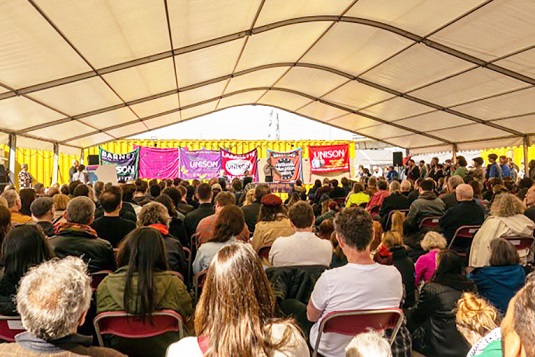
There is the appalling record of Keir Starmer's Labour government in office. For every crumb of improvement conceded by Number 10, they've dished out a bellyful of crap. They've attacked the most vulnerable members of our class, and are sensibly salting the earth for themselves in time for the local elections, never mind the general election four years hence. They're upsetting their media outriders too. Even those who loyally shilled for the Labour right between 2015 and 2019 are finding their frequent Faragist forays hard to stomach.
The left's disgust with Starmerism long precedes the shameful attempt to sack Diane Abbott's candidacy prior to the election. But, for once, this does not come from a place of electoral impotence. The re-election of Jeremy Corbyn in the teeth of the Labour machine, and the so-called Gaza independents - plus, you might say, the Greens - shows that constituency-level left insurgencies are possible. It is disappointing that nothing has come from this, nor the suspension of left wing Labour MPs where the development of a new working class party is concerned. And the vacuum has meant the Greens have leaned into their left wing credentials without much pushback from anybody. Meanwhile, reports continue circulating of behind-the-scenes efforts to cobble something together, without (it seems) much enthusiasm from Corbyn nor the other independents. Yet the party gap remains.
Which is something the SWP has noticed with their latest front, We Demand Change. An effort to link up (capitalise on) the new struggles emerging in reply to the cruelties and stupidities of Starmerism, its broad-based orientation makes it well-placed to pivot from anti-cuts to anti-corruption to anti-racist to anti-Trump campaigning in the blink of an eye. But at the inaugural rally in London on 29th March, the question of building a left electoral alternative kept cropping up, despite the customary SWP emphasis on building demonstrations and organising rallies. Being confronted with this appetite for something more, Tengely-Evans writes "There are two dangers - one is to stand on the sidelines of this debate about elections, the other is to go into it without fighting for revolutionary politics." But, as ever, the silences are significant too. What's missing is any justification for "SWP members ... standing as independent socialists". Sure, having seen the Jane Hindle - the Chesterfield candidate - literature, there is no doubt where she stands on Labour, war, capitalism, and the centrality of the working class. But why stand as independents instead of straightforward SWP candidates?
The reason? None is given. Could it be that, sadly, independent candidates for several reasons are more likely to do better than socialist candidates that stand under a socialist banner? The obvious answer is yes, if the TUSC experience is anything to go by. But it has the happy side effect of any campaigning not generating an organisational dynamic for a wider body the SWP might otherwise sit in and lose activists to. Thinking about the relationships the SWP wants to cultivate, it does not put the Corbyn/Collective crew on the spot, nor pressurise the three remaining Labour MPs without the whip, nor the Gaza Independents, nor the conservatives in its own ranks wedded to the SWP's customary syndicalism. A smattering of "independent" councillors also gives them a bit of heft if a new party/umbrella alliance does eventually emerge too.
The problem with this approach is the anti-party logic independent candidatures play to. The SWP say they want to enter electoral politics to fight for their revolutionary views. But central to any understanding of Leninism is the irreducible nature of party organisation, which subordinates the individual to the collective will. How are they going to make the principled case in the coming years for a common and united leftist approach to elections if, between now and 2028/9, the SWP and anyone vaguely associated with We Demand Change are going to build election campaigns around individuals as individuals? This is not the stuff a cohesive, solidaristic politics is made of. And how then are those voters going to be carried over if, the next time, they do stand as socialists on a socialist outfit's ticket? It appears to me the Socialist Worker article forgot their ABCs even as the editor wrote them.
If the left, regardless of which part we're talking about, want to build an organisation to tackle elections as the left, they need to take a leaf from bourgeois politics and Labourism. Unite around a party identity, promote it over and above petty factional projects while rooting it in communities and workplaces, and when elections happen stand consistently. This is not a silver bullet, but it is the minimum level of seriousness required if Labour is to be taken on and taken out at the ballot box. The SWP's offering, despite their turn to elections, puts them on the path to ensuring such an outcome will come about very, very slowly.
Image Credit
A little bit out of sync with the routine, but who cares? Here are some more new left media projects that were picked up by the radar since last time.
1. BattleLines with Owen Jones (Blog) (Bluesky)
2. Heatwave (Magazine) (Bluesky)
3. Interregnum (Blog) (Bluesky)
4. We Demand Change (Campaign website)
If you know of any new(ish) blogs, podcasts, channels, Facebook pages, resources, spin offs from existing projects, campaign websites or whatever that haven't featured before then drop me a line via the comments, email, Bluesky, Facebook, or Twitter. Please note I'm looking for new media that has started within the last 12 months, give or take. The round up appears hereabouts when there are enough new entrants to justify a post!

There were two such examples from the last couple of days. In her mail out to subscribers, The I's Katy Balls reported on growing disquiet among Labour MPs about the party's strategy. One (anonymous, of course) insider said "If we’re doing Reform-lite policies, we shouldn’t be losing to Reform.” Balls observes that the government might, therefore, need to shore up its left flank with policies that, shock, left wing voters might like.
And then in The Economist we have Duncan Robinson laying into the delusions that have captured the Labour and Conservative Party leaderships. Starmerism and the Tories are beholden to a zombie politics in which their favourite voter is ... dead. This constituency, which haunts the imaginations of Morgan McSweeney, commits the government to the nonsenses of Brexit and the rejection of anything amounting to a sensible accommodation with the EU. He writes, "If, like everyone else in British politics, one is looking for right-leaning, Leave-voting non-graduates with particularly authoritarian views to attend a focus group, then the best place to find them is the morgue."
Long-time readers of this blog might be experiencing dejavu. Labour's right wing turn is unsustainable? You don't say. Right wing authoritarian politics is in long-term decline, and with it the parties dependent on these constituencies? Where have we heard that before? The basic, almost banal position of this corner of the internet is in the first instance the Conservatives, and Reform are subject to the aforementioned declinist pressures. Their base in wider society is ageing and dying, and not getting replaced like-for-like. For the moment, their support turns out disproportionately but any advantage the right holds here is time limited. It's therefore foolish in the extreme for a party like Labour, which still holds leads among working age people despite the collapse of the polling position, to hitch their wagon to a bunch of gee-gees ready for the knackers yard.
So we have an identification of a problem facing bourgeois politics, but what's missing from Balls's and Robinson's account is the explanation. It might seem puzzling that Kemi Badenoch's hapless leadership is abandoning efforts at winning back thw swathe of Tory seats lost to the Liberal Democrats for the sake of a handful of constituencies they conceded to Reform. However, the Tories - not unreasonably - believe Nigel Farage is the existential threat. To stand any chance of winning again, the Conservatives have to monopolise hardcore right wing voters. At least where the thinking of leading Tories are concerned. Only when the base is secure and the interlopers seen off can they think about taking back ground from the Lib Dems. The people Badenoch and friends have to attract might be dead, but their shades continue to animate the right wing media, which is still viewed as the voice of Tory England. Though these institutions are shedding readers to the Grim Reaper daily, their editorials are so much ouija spelling out what the Tories have to do.
And Labour? Being "responsible", the "grown up" thing is to put much political distance between their management of British capitalism, and the aspirations of the party's base. Fiscal rules, attacks on the disabled, pretending to be Brexit true-believers, the expired, ex-voters of 2019 vintage are convenient ghosts summoned from the spirit realm to haunt the excuses for inaction and cruelty. But the Labour leadership are deeply cynical mediums and lack the credulity of a Derek Acorah. Their conjuring is a fraud to alibi a politics of managing expectations. The promise of doing very little and continuing attacks on the most vulnerable and the scapegoats favoured by the Tories dampens demands on them to do progressive things, while also reassuring the ruling class that Starmerism means safety where the stability of class relations are concerned. This means the last thing the government want is to reject the dead in favour of the living, because securing Labour's future as an election winning machine that can bury the Tories and see off Reform will only happen if they strive to be capital's master, not its handmaiden. And I'm sure you don't need me to tell you how unlikely that is.

Being the soft left, and therefore the most loyal of oppositions, Dodds pointedly eschews finger pointing and goes for a very politic, almost Delphic critique. Mirroring her resignation statement, she said the world is "in flux" and government lacks "muscle memory". Hold on, I'm stopping this right here with a necessary digression. No "muscle memory"? Starmer wasn't in government until this year but, like the rest of us, he lived through Covid and the unprecedented interventions that crisis forced on the Tories. Indeed, he had a ringside seat and headed up an obsequious, spine-bending "opposition" to Boris Johnson's disastrous management. Before that, Starmer navigated the rough seas of Brexit to his political profit, came through Labour's internal wars against Jeremy Corbyn unscathed, and prior to entering the Commons led the Crown Prosecution Service through a period of Tory-imposed resource rationing. Readers here are unlikely to endorse how Starmer approached these challenges, but it's simply untrue to say he lacks experience dealing with "unprecedented crisis". Rather, it's been the default context since Starmer's career catapulted him into the upper echelons. If Starmer is carrying on with a business-as-usual mindset, it's not that he's an untested naif - he's choosing to. But as the soft left's role is to prick the conscience of the right rather than offer a distinct alternative, it's too much to expect Dodds to pick him up on that.
Dodds then raised her concerns about democratic backsliding and how liberal norms are being eroded, unwilling - of course - to acknowledge how these have been wrecked in the Labour Party which, after all, is as much part of our constitutional set up as acts of parliament and the House of Lords. This was why, for Dodds, we need to buddy up with other liberal democracies with UK-EU defence partnerships. But perhaps the most pointed of criticisms, which will undoubtedly be taken as a slight by Rachel Reeves despite the sugar-coated delivery, was the need to dump the "shibboleths". These are the "fiscal rules" and taxation, because "the very best-off have seen so little impact on their well-being from economic headwinds." Ouch.
From the point of view of mainstream politics, Dodds is right on the politics and the economics. To get around the costs of Donald Trump, the UK needs to turbocharge its domestic market. Reeves might not have any ideas of her own, but she did partially recognise this in her January infrastructure announcement. The problem is that stimulus policies are half-cocked if government is also sucking demand out of the economy, which it is with disability cuts and the increase on employers' National Insurance contributions. Our model for Dodds should be Germany and the huge spending splurge it announced to turn around its chugging economy. Seems quite sensible.
And ... it appears Starmer himself might be coming round to this view. Writing in the Sunday Telegraph, his paper of choice for strategic announcements, he talks about the trading relationship with the United States and the possibility of a trade deal, and says "We stand ready to use industrial policy to help shelter British business from the storm. Some people may feel uncomfortable about this – the idea the state should intervene directly to shape the market has often been derided. But we simply cannot cling on to old sentiments when the world is turning this fast." People can read into that what they like, and Labour supporters hungry for the thinnest of gruels undoubtedly will. He adds "...these new times demand a new mentality. We have gone further and faster on national security, now we must do the same on economic security through strengthened alliances and reducing barriers to trade." A new speech on the British economy has been slotted into the grid, bringing forward a raft of announcements scheduled for the summer.
A vindication of Dodds and the soft left? More a case of fortuitous timing and the soft left being more in tune with economic realities, but whatever comes out is not going to be straightforward. "Protections" in Starmer's iteration of Labourism have to walk the tightrope of delivering the goods without empowering the workers and frightening capital-at-large. Whatever agenda comes means that the left have also got to adapt its politics to match - otherwise, why bother listening to us?







